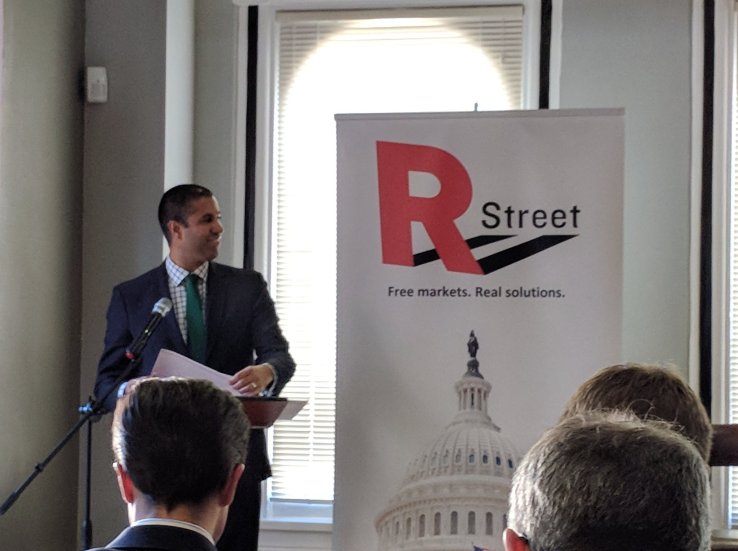

FCC Chairman Ajit Pai, as part of the plan to promote his plan to undo the country’s net neutrality rules, has thrown Twitter and other online services under the bus in order to show that it’s not just broadband providers that can exert control over internet content. “When it comes to an open Internet, Twitter is part of the problem,” he explained. “The company has a viewpoint and uses that viewpoint to discriminate.”
Pai’s remarks were made at an event hosted by the “free market think tank” R Street Institute and the “liberty”-focused Lincoln Network. Pai was joined by the other two Republican Commissioners, Brendan Carr and Mike O’Rielly, and FTC Chairman Maureen Ohlhausen. Needless to say, none of them is a fan of the existing 2015 rules.
The Chairman’s speech, which you can watch here along with the rest, began with a brief history and justification of the rollback. He specified exactly two downsides to the present rules: it decreases investment and it stifles innovation.
Neither of these things is true: the investment story is at best a mix and the numbers, like all numbers, can and have been cherry-picked to show different things. And the innovation thing is the same single example Pai has trotted out over and over — Charter fretting over rolling out some out-of-home Wi-Fi thing — and some vague obstacles faced by a number of smaller ISPs. (I actually contacted several of those ISPs earlier this year asking about how the 2015 order had affected them and none replied.)
Then Pai cited a few celebrity critics — Cher, Mark Ruffalo, Alyssa Milano — and dismissed their complaints. Notably he did not address any substantive criticisms, like the FCC’s incorrect interpretation of how the internet works, before turning his ire upon Silicon Valley.
He stated, as quoted above, that Twitter is “part of the problem.” After this followed some examples of platform partisanship:
Twitter blocked Representative Marsha Blackburn from advertising her Senate campaign launch video because it featured a pro-life message. Before that, during the so-called Day of Action, Twitter warned users that a link to a statement by one company on the topic of Internet regulation “may be unsafe.” And to say the least, the company appears to have a double standard when it comes to suspending or de-verifying conservative users’ accounts as opposed to those of liberal users. This conduct is many things, but it isn’t fighting for an open Internet.
But it’s not the only one. “Despite all the talk about the fear that broadband providers could decide what Internet content consumers can see,” he said, “Recent experience shows that so-called edge providers are in fact deciding what content they see. These providers routinely block or discriminate against content they don’t like.” (Emphasis Pai’s, in prepared remarks.)
Now, this is not an assertion that is without merit. The threat of large companies that touch a significant portion of content (such as Google and Cloudflare) having power over that content is a real one.
But he takes things a step too far:
In this way, edge providers are a much bigger actual threat to an open Internet than broadband providers, especially when it comes to discrimination on the basis of viewpoint… So let’s be clear. They might cloak their advocacy in the public interest, but the real interest of these Internet giants is in using the regulatory process to cement their dominance in the Internet economy.
There are a couple of things to unpack from the sleight of hand here.
For one thing, it’s a disingenuous comparison, like saying bullets are more dangerous than guns. The job of ISPs is to perform data-agnostic packet transmission. Edge providers, on the other hand, are in the business of sorting, modifying and presenting information to users according to various preferences, algorithms and, yes, ideologies. For many of them, “discrimination on the basis of viewpoint” is a feature, not a bug.
And even granting the comparison credence for a moment, it’s quite a stretch. Internet providers are in a position of incredible power as the main conduit for information to go from here to there. People are free to choose another search engine, quit Facebook and Twitter, or even start their own platforms, which indeed is how the present power structure was arrived at. But people (in the U.S. at least) are seldom free to easily change their internet provider, and of course that internet provider affects all their online activities, not just ones on a certain platform. So the idea that those reached through the internet are a greater threat than the ones that provide that reach is unconvincing.
But most importantly, the hypothetical bad behavior of another industry is not what should concern the FCC, and in fact is outside its jurisdiction; net neutrality is specifically about preventing the threat presented by broadband providers, keeping the pipe itself clear of blockage, throttling, fast lanes and so on.
The entire finger-pointing exercise is a distraction, and a petty one. Like a thief who shakes your hand while picking your pocket, he puts the focus on anything but the crime.
Featured Image: TechFreedom

